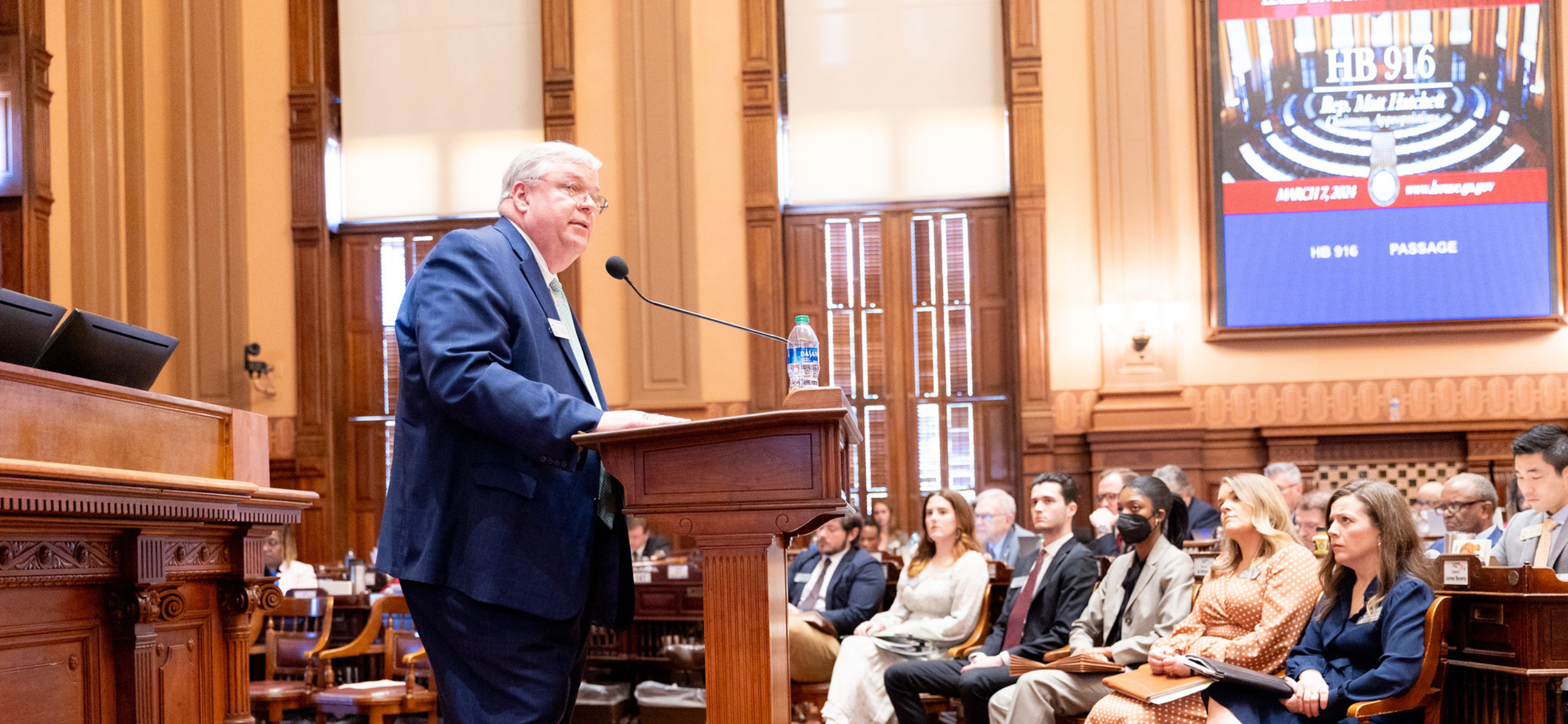Stay ahead of the curve as a political insider with deep policy analysis, daily briefings and policy-shaping tools.
Request a Demo2025 House budget calls for more funds for education, housing, state workers

House Appropriations Chair Matt Hatchett presented the House fiscal year 2025 budget on the House floor on March 7, 2024. (Credit: Georgia House)
The House on Thursday approved HB 916, which recommends modest changes to the $66.5 billion fiscal year 2025 budget submitted by Gov. Brian Kemp that includes $36.1 billion in spending of state funds.
The governor’s 2025 budget is a bit slimmer than the amended fiscal year 2024 state budget of $37.5 billion, which tapped $2 billion in state reserve funds for a number of one-time capital and infrastructure projects.
The budget now passes to the Senate for its review, amendment and approval.
While presenting the House budget on the floor, House Appropriations Chair Matt Hatchett, R-Dublin, said the governor’s recommended budget “provides the opportunity to make impactful and permanent changes in the state budget and policy.”
Noting that agency attrition is a problem statewide, Hatchett said that 4% pay raises for state employees, plus $3,000 raises for law enforcement and correction officers, and workers in high-turnover positions such as case workers involved with child welfare and elder abuse, would “help move the needle” on recruitment and retention.
The vacancy rate for assistant district attorneys statewide is 10%, Hatchett said, and the House has decided to spend $15.2 million to raise their annual pay to $71,000 from $58,000 “to bring stability to DAs offices throughout the state.” The House is also recommending an additional $10.6 million to increase the salaries of judges in superior courts, appellate courts and the Georgia Supreme Court.
Other highlights of the 2025 budget:
Education

- $14.1 billion to fully fund the Quality Basic Education (QBE) program for K-12 education
- $373 million to provide $2,500 salary increases to certified teachers and employees
- $358 million in ongoing funding for pupil transportation, which Hatchett called “an unprecedented investment” by the governor. “With QBE fully funded, our attention now turns to the other formula, which is a partnership between the state and local school systems that has historically been underfunded until now. This budget includes an infusion of $204 million to reflect current bus count and mileage figures not updated in more than a decade, and an increase in operating to 40% of cost. This investment more than doubles the state’s spending for pupil transportation and benefits all systems, rural and urban, small and large.”
- $104 million for school security services and personnel, also a new permanent funding stream
- $6.3 million to cover the cost of breakfast and lunch for reduced price students
- $266 million in new funds for equalization grants to systems whose property tax wealth is below the statewide average, for a total spend of $1 billion
- $6.3 million for literacy coaches and $5 million for universal reading screeners for K-3 students
- $4.6 million to increase Childcare and Parent Services program pay rates for child care providers to 50% of market rates from 25%, in an effort to address widespread worker shortages and potential closure of early childhood education centers.
- $9.5 million in lottery funds to reduce pre-K class sizes to 20 from 22, a reduction that will be phased in over four years and result in 382 new classrooms. The first year will add 96 classrooms.
- $8.9 million in lottery funds to continue summer transition programs for pre-K students, replacing expiring federal funds provided during the pandemic
Economic development
- $6 million to expand rural workforce housing
- $3.7 million for homeless services, leveraging federal grants as proposed by the governor, plus another $1 million added by the House for a new initiative for organizations that help the homeless obtain short-term, stable housing
Health
- $141 million for skilled nursing centers
- $80 million for 40% pay rate increases for providers serving people with intellectual and developmental disabilities in home- and community-based settings, and $3.2 million for the Macon Crisis Stabilization Diagnostic Center, which will serve as the state’s first crisis support center for adults with intellectual and developmental disabilities
- $27 million for behavioral health provider rate increases
- Increases for providers serving Medicaid patients, including $9.6 million for dental services, $8.4 million for primary care physicians and obstetricians; $7.5 million for speech therapists, audiologists and physical therapists; and $3.4 million for emergency medical services transportation
- $2.9 million to support Georgians experiencing homelessness by funding over 300 housing voucher slots, behavioral health services and rapid rehousing
- $2 million for 105 new residency slots in graduate medical education
- $1.7 million to expand a pilot program for home visiting in at-risk and rural communities
- $2.5 million to stabilize the Georgia Trauma Care Network
Higher education
The House’s proposed budget for higher education is $3.1 billion, including:
- $92 million for a 4% cost-of-living increase for University System of Georgia employees, plus an increase of $2.9 million for USG programs
- $66 million to restore funds for teaching programs at smaller colleges, funds that were vetoed by Kemp last year
- $91.3 million for the Dual Enrollment program, which served over 52,000 students in fiscal year 2023 and continues to grow, including $15 million the House added$7.4 million to expand the high-demand career program areas of aviation, commercial truck driving and nursing at technical schools, a new allocation added by the House
Public safety
- $50 million for $3,000 pay increases for law enforcement officers in 21 state agencies
- $72 million for physical and pharmaceutical services for inmates
- $21 million for pay raises for staff attorneys in state courts, including assistant district attorneys
- $10.6 million for salary increases for state court judges
- $14.7 million for 48 domestic violence shelters and 28 sexual assault centers, and another $4 million for sexual assault nurse examiners to provide the examinations needed to prosecute offenders and to handle victims “with care and integrity.”
- $2.5 million for targeted salary increases for Georgia Bureau of Investigation scientists, lab technicians and investigators and $1.7 million for scientists and crime lab technicians to address the backlog of 38,000 pieces of evidence
General government and human resources
- $21.5 million to enhance cybersecurity services provided to executive branch agencies
- $2 million to address the appeals hearing case backlog at the Department of Labor
- $10.5 million for additional Capitol Police security and operations
- $2.5 million for a third-party ballot auditing technology to allow the Secretary of State’s Office to audit ballots using text instead of computer-generated QR codes
- $2.1 million for an overhaul of the Professional Licensing Boards Division in the Secretary of State’s Office, including 27 new employees and new equipment
- $1 million to support children who’ve experienced abuse, neglect, exploitation or trafficking for the court-appointed special advocates program and $1.5 million to the state’s Child Advocacy Centers for increased forensic and mental health services.
- $532,000 for the Sexual Offender Risk Review Board to add five new evaluators to address the current case backlog
- $608,000 to support children and adults with autism through enrichment and employment opportunities, psychiatric services and screening
Transportation

The total state budget for transportation is $2.4 billion, including roads, bridges and electric vehicle infrastructure. The fiscal year 2025 budget includes a $41 million increase in capital programs and an additional $36 million for routine maintenance.
Have questions? Contact Jill Jordan Sieder on X @journalistajill or at [email protected]
And subscribe to State Affairs so you do not miss an update.
X @StateAffairsGA
Instagram@StateAffairsGA
Facebook @StateAffairsGA
LinkedIn @StateAffairs
Newly minted Senate Minority Leader Harold Jones II: ‘I’m not the typical back-slapping politician’
Nearly 10 years into legislative life, Sen. Harold Jones II wouldn’t change anything about the experience. “I love every minute of it. Even when I hate it, I love it,” the 55-year-old Augusta Democrat told State Affairs. Come January, Jones will add another role to his legislative duties: Senate minority leader, a job held for …
Gov. Kemp calls on state agencies to be fiscally restrained amid record $16.5B surplus
The Gist Gov. Brian Kemp asked the state’s 51 government agencies for continued fiscal restraint when drafting their amended fiscal year 2025 and 2026 budgets. Most agencies adhered to his request even as the state’s general fund surplus hit a record $16.5 billion last month. Forty-five agencies, excluding state courts, followed the governor’s instructions to …
Georgia defies bomb threats as election chief declares a “free, fair and fast” vote amid record turnout
ATLANTA – Despite dealing with over 60 bomb threats, Georgia’s election chief said Tuesday the state’s general election went smoothly. Georgia had a record turnout with nearly 5.3 million people voting, Secretary of State Brad Raffensperger told reporters. Election officials in the state’s 159 counties have until 5 p.m. to certify votes. “We had a …
In the (state)house: Meet the newest members of the Georgia legislature
When lawmakers reconvene at the state Capitol on Jan. 13, there’ll be a cadre of new faces in the 236-member Georgia General Assembly, one of the nation’s largest state legislatures. All 236 statehouse seats were up for election this year. Most candidates ran unopposed. Incumbents in contested races easily kept their seats, with the exception …




